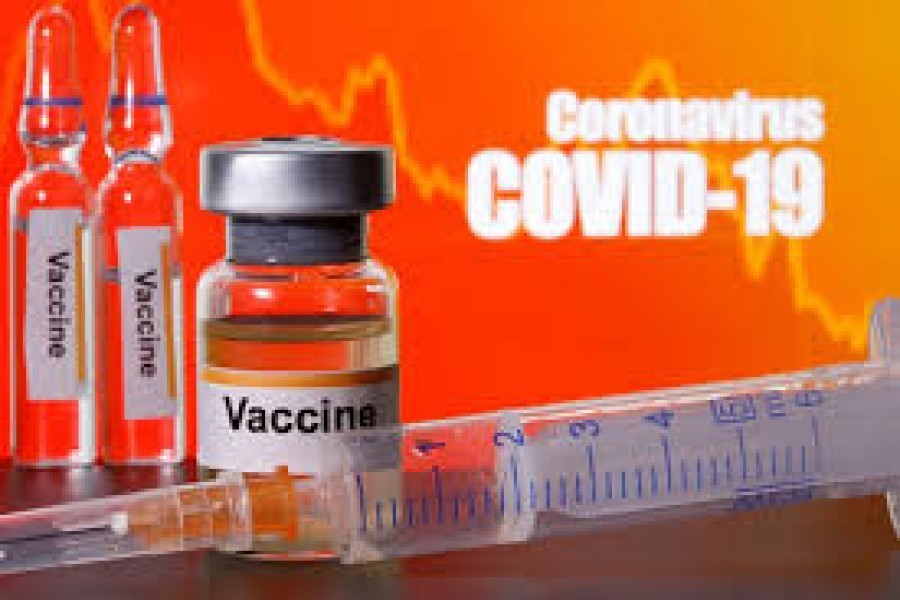The government, during the 'surprise' visit of the Indian foreign secretary Harsh Vardhan Shringla last week, offered to conduct the phase-three trial of the vaccine being developed by the giant next-door-neighbour. The offer was reportedly voluntary. However, it is not known whether Bangladesh did try to barter the trial of India's vaccine, which is still in the preliminary phase, with the availability of the Oxford vaccine, to be produced in India, here.
The vaccine element added a special dimension to Mr Shringla's visit because of the government's indecision centring around the Chinese company Sionovac's offer to conduct the phase-three trial of its vaccine on Bangladeshi health workers.
True, the government has not yet given its decision on the trial of the vaccine developed by the Chinese biotech company Sinovac. But it has not said 'no' either in line with its declared policy to keep all options open as far as securing of vaccine is concerned.
All these have been happening when people here like billions across the world are counting days eagerly for an effective vaccine against the novel coronavirus.
As time progresses the possibility of having an effective vaccine is becoming brighter. One country, Russia, has already developed its vaccine, but scepticism about it is running high since the country has, allegedly, skipped the all-important third-phase trial involving a large number of human subjects and held back all information about the vaccine trial.
The Oxford University vaccine that is thought to be the most advanced one might be ready for commercial production within the next couple of months. Pfizer, a leading drug manufacturer of the USA has claimed the development of a vaccine effective against coronavirus. The vaccine is now on the trial. The company expects to seek regulatory approval for the vaccine in October next. The US government is also pinning much hope on the Moderna's vaccine, which is also undergoing phase-3 clinical trial now. Overall, more than 200 vaccines are now in different stages of the trial across the world.
While drug manufacturers are seeing the vaccine as an enormous opportunity to spin money, some countries are involved in using it as a political tool. President Vladimir Putin's declaration about the development of the first Covid vaccine is designed to score some points over its rivals in global politics. Some people tend to see the offer to conduct a clinical trial of the Sinovac's vaccine in Bangladesh as part of the Chinese move to strengthen its influence in the South Asia region. Then again, the latest visit of the Indian foreign secretary to Dhaka is viewed as an Indian move to pare down the so-called Chinese influence in Bangladesh. There is no dearth of interpretation.
The people are least interested in the 'rivalry' between China and India, two arch-rivals in the region. The deadly pathogen while claiming thousands of lives has disrupted seriously their economic well-being. They want an effective vaccine at the earliest at no cost or the least cost.
The possibility of Bangladesh's access to the vaccines being developed by the Oxford University and Sinovac appears to be bright. Bangladesh, honestly speaking, is in a very delicate situation as far as vaccine trial is concerned.
A joint statement issued by a group of scientists linked to the International Centre for Diarrhoeal Diseases on the Sinovac deserves to be taken into account by the Bangladesh policymakers. The ICCDR, B is tasked to oversee the trial of the vaccine.
The scientists who include Prof John D Clemens, executive director of ICCDR,B, Prof Jan Holmgren of the University of Goteborg, Sweden, Dr K. Zaman, senior scientist at ICDDR,B, Dr Firdausi Qadri, a senior scientist at ICCDR, B and Prof Allen Ross, senior director of infectious disease division of ICDDR,B, dismissed the negative comments against the vaccine developed by Sinovac. They have claimed that the vaccine was showing 'great promise'.
The ICCDR,B plans to enrol 4200 literate healthcare workers of seven hospitals located in the metropolitan Dhaka for the phase-three trial of the Sinovac vaccine.
The scientists, in their joint statement, said, in the event of a successful trial of the vaccine, Sinovac has agreed to provide 110,000 free vaccine doses to Bangladesh.
More importantly, they said, the Chinese biotech company has committed to transfer the technology for production of the vaccine, as well as bulk vaccine, to a Bangladeshi qualified producer at a discounted price to meet the need of the larger population of Bangladesh.
The scientists have made a fervent appeal to the Bangladesh government to give the proposed trial of the Sinovac's vaccine approval and 'full support'.
These scientists have no reasons to be guided by any other consideration than to find what is right for and beneficial to Bangladesh.
Since the government has an avowed policy of keeping all options open as far as Covid-19 vaccine is concerned, it should not miss the opportunity offered by Sinovac. The Sinovac vaccine which is now undergoing trial in Brazil on a massive scale will also be tried in four more countries, including Bangladesh, Saudi Arabia and Indonesia. Bangladesh, however, should also keep its door open to India's vaccine when it is ready for the clinical trial. There should not be any politics, regional or otherwise, when it comes to a serious health issue such as Covid-19.


